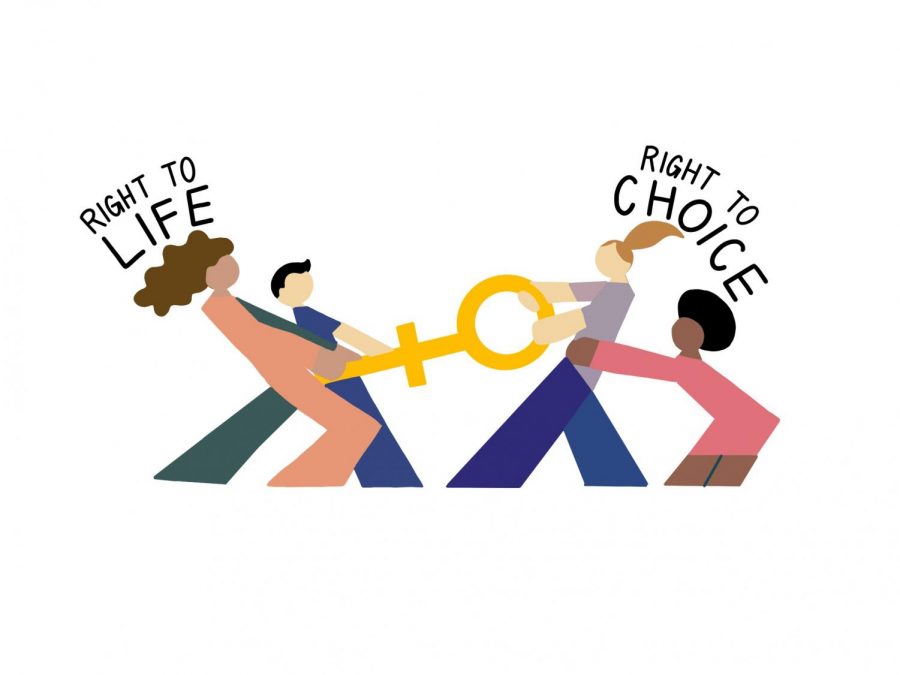Why People Will Always Disagree On Abortion, and What Can Be Done About It
I have been both pro-life and pro-choice in my 20 years on this Earth. In both cases, I held very strong opinions and feelings on the issue. After years of searching for the correct answer to whether abortion should be legal, I finally realized that there isn’t one.
Despite abortion being a politicized issue in today’s day and age, I firmly stand by my belief that abortion has never been an issue of politics, but one of morality. There is a reason why humanity has still not come to a clear consensus on whether to accept this phenomenon. In the past, there were instances where society introduced concepts that were first deemed as unconventional and abnormal, but were later accepted and normalized. An example of this is same-sex marriage; in early 2002 only about 31 percent of Americans supported gay marriage, but by the end of 2019 the approval rating grew to 61 percent. This same pattern has not been seen with abortion. Since the passing of Roe v. Wade, the support and opposition rates for legalized abortion have come in at about 50 percent each way. I firmly believe that as long as humanity exists, we will never come to a unanimous decision regarding abortion. The reason behind this is as simple as it is complicated: people have their own moral compasses that are almost impossible to change. If a person with their entire heart believes that abortion is murder and immoral, it will be nearly impossible to change their mind. The circumstances of conception often mean little to those who believe abortion is murder.
Morality will always be a gray area for humans because we rely on our feelings to know what is right or wrong. Within the realm of science, certain occurrences are proven and validated using laws or theories that are applicable during any and all circumstances. These are the principles that state things like “if you drop an apple, it will always fall downwards,” or “if you fuse two hydrogen atoms and one oxygen atom together, you will get water.” Science gives us precision, and because of that precision we will always know what the right answer is.
Set rules like these do not exist in philosophy, especially with regards to morality. The only things guiding us to make set choices in life are feelings and consciousness. The reality of life is that every human perceives the world through their own set of eyes, a set that is different from everyone else’s. This is the reason why there will never be a ‘right way’ to live life. Heck, humanity can’t even agree on the nature of morality itself.
There are two potential ways to consider morality: moral relativism and moral absolutism. A moral relativist would argue that morality is circumstantial and that the things that determine whether or not something is moral depends on the situation as well as the intentions of a person. For example, stealing is considered a moral evil. However, if the person was stealing something back that already belonged to them, a moral relativist might argue that that makes the theft okay or at least justifiable. A moral absolutist, however, does not believe that committing an immoral deed is ever okay. Something is either moral, or it isn’t.
Opponents of abortion consider it murder, but because people have different definitions of what constitutes murder and when murder is acceptable, there will never be a set answer as to whether abortion is moral. Both sides of the abortion debate have some very compelling arguments, yet the question of who is right in this argument has yet to be answered. So who is right? Is it the people that claim to protect the unborn? Or is it the people that claim to protect bodily autonomy and spare the unborn child a life full of suffering?
The answer is that we will never know.
To provide a new perspective to the abortion debate, let’s compare abortion to veganism. Most vegans fundamentally believe that meat production was, is, and always will be the murder of innocent animals. Some would go so far to say that if they had to choose between starving to death or eating meat again, they would pick starvation. Many vegans tend to favor moral absolutism; to them, consuming animal products is not okay under any circumstances. Admittedly, there are vegans who tend to be accepting of what others believe in, while others take a more aggressive approach to promoting their beliefs. In the last decade, vegan protests have become a viral sensation because of how obnoxious they tend to get. However, despite making absolute clowns of themselves and scaring the living hell out of confused bystanders, the protesting vegans firmly believe that they are doing the right thing by fighting for the animals to save them from certain death. Some protesters will go as far as breaking onto private property, subsequently putting themselves and others into dangerous situations simply to prove their points that eating animals is never acceptable. These people are often shunned and are told to “leave meat-eaters alone,” and to “mind their own business.”
What people don’t realize is that pro-lifers intentionally put themselves into similar spotlights. Some attend massive protests and go out of their way to barricade women’s clinics on their days off. Others go to more extreme lengths and send death threats to gynecologists or threaten to bomb Planned Parenthood centers. In their eyes, they are doing the right thing, but to those who may not necessarily agree with their views, their actions may cause great feelings of concern, pain and worry. Despite this, their minds cannot and will not be changed. Just like the vegans, they will continue to fight for what they believe is right.
Abortion is an ethical dilemma. As a result, I doubt that humanity will ever agree on the morality of abortion. Today, I remain firmly pro-choice, but on a personal level I know that I could never go through with getting an abortion if I were to find myself in that situation. But that is my personal opinion. My feelings on the matter have no place in the decisions of other women and their bodies. I also happen to be a vegan. Once again, I would say that my dietary choices have no place on the plates or the fridges of other people. I think that eating meat is immoral and I will never touch an animal product ever again. But that is a choice that I have made for myself, not for others. You might firmly believe that abortion is the murder of innocent unborn babies. But that needs to remain your opinion. The way you perceive morality is different from everyone else, and there truly is no right or wrong answer. If you believe abortion is immoral, you are entitled to that opinion. But leave that decision to yourself. If you believe meat is murder, you are also entitled to that opinion. Once again, leave that decision to yourself. As a human race, we need to understand that our opinions on everything— including morals— will always differ. The very least we can do is coexist with each other’s perspectives and accept that others will think differently than we do. This goes for both sides of the argument.
Your donation will support the student journalists of Saint Louis University. Your contribution will help us cover our annual website hosting costs.











cara eddy • Oct 1, 2021 at 3:17 am
good argument, kind of runs off the point a lot.
JD • Apr 8, 2021 at 11:45 pm
Abortion is not a moral issue. I will explain below with the framework that a fetus is a human and is not a human.
I do not think that a fetus, sperm+egg, etc is a human being. It’s just a clump of cells. The mere fact that a fetus cannot survive on its own without the mother proves that they are not a living independent human being. Not to mention the real and irreversible harm that a mother must go through during pregnancy. It is incredibly cruel as a society and government to force women to carry fetuses to term if they don’t want them. Thus, abortion is logically sound.
Now lets assume that a fetus IS a human being. Same as above, that human will die if they do not leech off of the resources of the mother’s body. There is no moral or legal basis saying that a human must be forced to keep another human alive that has invaded their body. Thus, abortion is logically sound.
Also, your medical ethics argument doesn’t make sense. If all doctors have to abide by that overly simplified model you produced, no doctors would perform abortions yet alone have clinics.
JD • Mar 25, 2021 at 9:09 am
In ethics class we had a great discussion about this. In medicine there is a model to determine if something is ethical or not. When you use that model it is unequivocally not ethical to perform 99% of abortions. The only ethical time to abort would be when the life of the mother is nearly certain to be killed by the pregnancy. Why? Well it’s simple, the ultimate test in medicine is not to harm. Abortion is the ultimate harm to the life or potential life of the unborn. No consequence to the mother is equal. Every consequence to her is temporary even if unwanted or undesired. Every argument otherwise is just a justification of feelings.